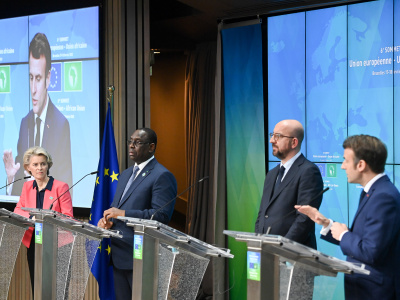Members of the
African Union (AU) have a long history of decolonisation and liberation struggles. For many Africans and global actors, there is still some misperception surrounding the role and value the AU has today. Yet, there is much more to the AU than meets the eye.
The birth of African unity
The
Organisation of African Unity (OAU) was established on May 25, 1963, in Addis Ababa, Ethiopia, at a time when there was urgency for independence and liberation in many countries. The OAU was the first continental organisation integrating Africa, presenting the continent as one on the international stage and defending the continent's interests. When the OAU is remembered and talked about, it is with a lot of nostalgia given the struggle that many of the
founding fathers, from about 32 African states that were independent at the time, had to go through to accomplish the kind of greater Pan-African unity envisioned then. Even more recognised is the fact that the OAU led to the formation of the AU, which has evolved to characterise a political, social and economically united Africa in many areas.
The African Union today
Since its launch, the AU has evolved and brought the
African agenda to the global arena in several ways, most importantly by being the convening body of
54 Member States. The AU
“put Africa on the map” during international negotiations - specifically on: peace and security, migration, the Sustainable Development Goals (SDGs), and climate change. The most significant role that the AU offers is, therefore, that of a platform that brings together the African voices in the global arena. The AU also acts as an advocacy entity, where it has coordinated African countries to adopt Common African Positions on matters affecting the continent where there is a need for bloc negotiations. For international partners, the rise of the AU provides them with a single interlocutor, instead of having to talk with 54 individual countries. In the last ten years, the AU has also been recognised for its very
active role in the promotion of women, gender and development. One major stride has been the declaration of 2016 as the ‘
African Year of Human Rights with a particular focus on the Rights of Women’, with a focus on advancing the civil, political, economic, social, cultural, and environmental rights as well as the right to peace for women in Africa. Further, the election of the first ever woman to chair the continental body in 2012,
H.E. Dr. Nkosazana Dlamini Zuma, who is also the current chairperson, was considered a huge win for women leadership in Africa. Thus, in addition to unity and solidarity of the African people, the AU continues to work on many of the objectives it set out to achieve in its
Constitutive Act.
Trying to achieve the various AU treaties, conventions, protocols and charters is not without its challenges
For one, the
Ebola crisis, which was the largest of its kind since the first outbreak in 1976, severely affecting countries in West Africa (including Guinea, Liberia and Sierra Leone), was a true test of the value of having a regional African organisation. The AU held a meeting of ministers, contributed funds and got involved in the humanitarian efforts through the African Union Support to the Ebola Outbreak in West Africa programme (
ASEOWA). The AU’s role in averting the Ebola crisis was termed by some as
heroic, while there was also criticism that
the AU took four to six months to respond after the crisis began. Even more challenging for the AU have been the various violent conflicts on the continent - South Sudan, Burundi, Ivory Coast, Libya, Mali, Guinea-Bissau, Somalia, Western Sahara dispute of territory with Morocco, and the Democratic Republic of Congo. The
AU continues to face a huge challenge in dealing with African conflicts that are ongoing or newly erupting due to the changing dynamics and complexities of conflict in Africa. Further, Africa is a continent of
roughly 1.2 billion people, who are mostly young and living in the urban areas. The clear challenge for the AU in this is that the continental body has to establish itself well enough to be able to present policy frameworks for the well-being of the high population, while also addressing issues of poverty, inequality, lack of basic needs for the population moving to the urban areas. Finally, the
African continent is the one that is being most affected by climate change. As resources, land and water become increasingly scarce as a result of impacts of climate change, people’s livelihoods are affected and there is increasing poverty in rural areas. To effectively address the effects of climate change, the AU needs to look into its environmental policies. The African Union is expected to address all these pressing issues with very limited capacity and funding.
Funding remains a key problem as member states do not finance the major costs of the body, thereby leading to reliance on external funding. External partners fund 98% of the AU’s programme budget and 99% of the Peace and Security Operations. This reliance on external funding is to some extent connected to what the AU has been able to achieve and what it has not been able to achieve over the past years. Current funding, especially towards programmatic activities and projects, is seen as being in the interests of external actors without an assessment of the African institutional needs or capacities.
Silos of success for the African Union
While there have been challenges, it would be unfair to condemn the AU for not being able to solve all of Africa’s challenges. It is important to recognise what the AU has achieved for the continent through its various mechanisms and institutions. One of the successes of the AU has been the
African Peace and Security Architecture (APSA). The number of violent conflicts in Africa has reduced significantly since the onset of APSA, which has made a tremendous contribution to conflict prevention, mediation, and peace support. It shows that the AU is not just an emerging actor, but already a significant global player in the area of peace and security. Furthermore, on issues related to good governance, the AU has established the
African Governance Architecture (AGA) which is much needed to ensure good governance to achieve sustainable solutions. The AU also supports
continuous efforts to further regional integration through the Regional Economic Communities (RECs). RECs facilitate regional political, economic and social relations, thus acting as the building blocks of the AU. Looking to the future, as the AU moves more into the global arena of alliance and coalition building, work and focus on the deeply rooted organisational constraints are necessary for institutional reform. Further, harnessing the power of partnerships, effectively addressing financing challenges, reconnecting with the citizens - especially the youth - and build capacity within the continent to deal with peace and security and migration issues are just some of the steps that will help galvanize the AU’s potential.
Read the story online
The views expressed here are those of the author and not necessarily those of ECDPM.



